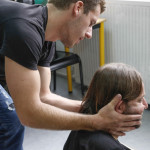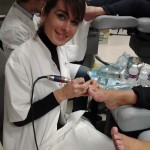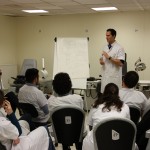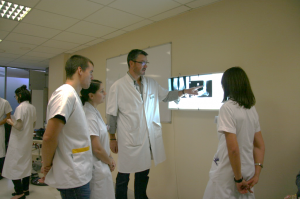Questions and answers – FAQ
FAQ: questions from parents or from students?
I – Questions from parents…
Which qualities are required to become a physiotherapist?

Working as a physiotherapist requires an interest in people, observational skills, the ability to listen to patients and adapt to their needs. Physiotherapists must also have some degree of manual dexterity and have good fitness levels.
Which qualities are required to become a podiatrist?

Working as a podiatrist requires both excellent manual skills and a keen interest in people. Podiatrists must also be able to work independently and autonomously. Ecole d’Assas helps students to develop or gain these qualities.
How do we get advice?
There are 600 CIOs (Careers Advice Centres) located all over France. A specialist guidance team at each CIO can answer any question about training courses and careers. You can also get free appointments with a guidance/psychology consultant who can help guide your children and give them the keys to unlock the right career path for their profile.
You can also meet healthcare professionals and discuss their work with them during personal encounters or work forums (there is a range of fairs devoted to the healthcare and social sector).
Each pathway is different: the development and decision process varies from one person to the next. Entrance exams for physiotherapy and podiatry can be taken at the end of Year 13 or after one or two years on an intensive foundation course. However, Assas students often lean towards a shorter and more practical training course after long years of studies.
Which BAC is best?
A science baccalaureate is highly recommended as physiotherapy and podiatry entrance exams are based on Year 12 and 13 science programmes. However, a science baccalaureate is not compulsory: as long as the student who has chosen another route does an intensive foundation course, they can pass the entrance exams.
How does Ecole d’Assas provide teaching support to students?
Ecole d’Assas demands a high standard of training and knowledge acquisition so the college is particularly focused on student support and teaching assistance: most of the teaching staff have experience in both therapy and teaching (following a university course in Learning Sciences). Teachers strive for students to progress both in theory and practice and support them until they join the professional world. They encourage work in small groups to enable better learning and more personal training. In both subjects, physiotherapy and podiatry, students are supported by:
- A head of year
- A head of department
What are the job prospects?
In physiotherapy, 79% of 80,000 professionals choose to work in the private sector. There are many opportunities: replacements for maternity leave, assistantship, partnership, taking over a clinic following retirement. Although certain areas are starting to get swamped, the increasing focus on leisure, wellbeing and the ageing population means demand is always high for physiotherapy treatment.
Podiatry is undoubtedly an industry that’s flourishing. There are just 10,000 podiatrists in France despite one in five French people suffering from foot pain every year and requiring professional help.
The private sector has a lot of prospects with over 98% of professionals choosing this pathway.
How much do physiotherapists and podiatrists earn?
In 2010, a physiotherapist’s average net monthly income in the private sector was 3500€ per month. A podiatrist working privately earns between 1600 and 2400€ net per month. These are averages: all professionals choose the work that suits them.
To set up, an initial start-up investment is required (approx. 30,000€ for a podiatrist and approx. 10,000€ for a physiotherapist). Loans can be taken out but young graduates often choose to begin their professional careers as replacements or prefer to partner with other professionals to share the costs. Salaried work is not as well-paid but the advantage is that it doesn’t require any initial investment. On average, a physiotherapist’s or podiatrist’s salary in the public sector starts at approximately 1400€ net per month and rises to 2200€ at the end of their career. Wage scales are slightly better in the private sector.
II – Questions from students…
How hard is it to pass the physiotherapy or podiatry exam?
The physiotherapy entrance exams address the Year 12 and 13 science programmes in Biology, Physics and Chemistry and the content of these programmes is altered on a regular basis. Most candidates spend a year on an intensive foundation course to review the programmes and gain experience with mock exams. Students can take the entrance exams in Year 13 however the number of secondary school students who pass the physiotherapy exam straight away is low.
The situation is slightly different in podiatry. Students can pass the exam if they carefully review the Year 12 and 13 biology programme. Some people do prefer to spend a year on an intensive foundation course to better their chances of success.
Can you take several exams?
Of course, each college organises its own exams under the Ministry of Health. Sometimes a candidate can fail one of the tests so you can take several exams to better your chances.
Can you join Ecole d’Assas after a PACES?
Ecole d’Assas’ IFMK (Physiotherapy Training College) has saved 20 spaces for PACES students from the Université de Versailles-Saint-Quentin-en-Yvelines (UVSQ) every year since 2013. IFMK candidates are selected based on their grades at the end of the PACES (foundation year in health studies). For further information, please contact UVSQ.
Can you join Ecole d’Assas with a physiotherapy degree from overseas (outside the EU)
Graduates with a physiotherapy qualification or degree from overseas who are not liable to benefit from the provisions which apply to nationals from an EU member state or another state with a European Economic Area agreement or the Swiss Confederation who wishes to work in France must take the selection exams to join a physiotherapy training centre in order to get a physiotherapy state qualification.
For further information, please view the official text on Legifrance
For full information about entrance exams, please contact us.
How many sites are there at IFMK Assas?
IFMK Assas has two sites devoted to foundation physiotherapy training: one in Paris (86 students) and one in Montigny-le-Bretonneux (30 students).
The first year student quota is 116.
Is there a lot of work once you start college?
Ecole d’Assas demands a high standard of training and knowledge acquisition in both physiotherapy and podiatry as there are two goals: a state qualification and quality professional work. Regular study satisfies theory requirements. Extensive practical knowledge is required as students appreciate practical work.
Why choose Ecole d’Assas?
- Ecole d’Assas has almost 80 years of experience. It has trained thousands of physiotherapists and podiatrists who have cemented its reputation.
- Ecole d’Assas is famous for the standard of its teaching, expertise and the commitment of its teaching staff who ensure 100% success in the physiotherapy and podiatry state qualification.
- Almost half of physiotherapy training is spent on placements. Ecole d’Assas provides its students with a placement department to support them throughout their training to choose the placement fields which best suit their personal plans. The college has a range of 1200 physiotherapy placements in and outside Ile-de-France and abroad.
- Ecole d’Assas is one of few colleges in France to have an international department helping students find placement opportunities abroad. Partnerships are gradually being built with hospitals on 5 continents.
- Ecole d’Assas is one of few colleges in Ile-de France to provide apprenticeship training in physiotherapy, a system that allows students to alternate between studying and paid work in a health centre. The CFA (French apprenticeship training contract) enables students to fund their studies and join the professional world. A dedicated administration department helps all students to find an employer.
- Students greatly appreciate Ecole d’Assas for the sense of mutual aid, learning between students and support from teachers until students join the professional world.
- Ecole d’Assas has an alumni network which plays a major role in training and preparing to start professional life.
- Ecole d’Assas is popular for its great location: the centre in the 15th arrondissement is in the heart of Paris whilst the Saint-Quentin-en-Yvelines centre is on the train station’s doorstep.
When do you start leaning towards this sector?
Everyone starts when they want. 60% of Assas physiotherapy students choose their path during Year 13. They take the exam straight after their baccalaureate or take an intensive foundation course then join one or two years later. 40% of our students initially lean towards medical, pharmaceutical or biological sectors before choosing physiotherapy. Some even start studying subjects with little in common with the paramedical sector (engineering, physician, IT).
Where do you stay during the course?
Ecole d’Assas has an up-to-date list of rental accommodation. It tends to be accommodation that graduates have now left.
For any information, please visit reception at Ecole d’Assas once your registration has been confirmed.
The Student Union can also put you in touch with students who want to house share.
Please feel free to contact students on the Student Union’s Facebook page:
Physiotherapy student union: https://fr-fr.facebook.com/goka.bde
Podiatry student union: https://fr-fr.facebook.com/gopa.bdepodoassas




